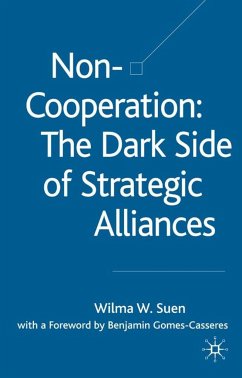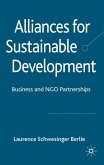What influences your partners' attitudes toward your alliance? What factors allow them to act on non-cooperative impulses? How can you structure your alliance to reduce opportunities for non-cooperation? This book explores the influences on a firm's attitudes toward its alliance, and highlights the connections between these factors. The book defines a framework to measure power and interdependence to determine which firms are able to act on non-cooperative impulses, and case studies illustrate how alliances may be structured to reduce opportunities for non-cooperation.
Hinweis: Dieser Artikel kann nur an eine deutsche Lieferadresse ausgeliefert werden.
Hinweis: Dieser Artikel kann nur an eine deutsche Lieferadresse ausgeliefert werden.
'The alliance field is already congested with books and articles that all too often follow well-worn paths. This book is different. It aims to redress some imbalances in the conventional wisdom in the field and to introduce new perspectives. As such, it justifies our attention in a crowded field and deserves to be studied by alliance scholars and managers alike.' - Benjamin Gomes-Casseres, Professor of International Business, Brandeis University, USA
'Firms must be as wary of their partners as their competitors. This book offers unique insights into the role of power and interdependence in sustaining alliances and in allocating their gains fairly or unfairly, depending upon one's point of view. Wilma Suen's theory opens a promising new avenue for interdisciplinary academic researchers to build upon, and may prove invaluable to business leaders watching their backs and their allies.' - Lee W. McKnight, Associate Professor of Information Studies, Syracuse University, USA; Research Affiliate, Massachusetts Institute of Technology, USA; and Founder, Chairman, President, and interim CEO, Wireless Grids Corporation, USA
'Firms cooperate to compete. Understood as a means towards an end strategic alliances are a key component of corporate global strategies as long as they are used opportunistically. Asking why do strategic alliances fail this path-breaking book focuses on their dark side - the why and how of non-cooperation which result in the demise of 50% ofall alliances. By forcing managers to take a realistic view of alliances dynamic costs/benefits ratio this study will guide any executives designing new alliances, managing existing alliances or scheming exit from stalled alliances. A must read for the savvy and nimble geocentric manager of the twenty-first-century.' - Laurent L. Jacque, Academic Dean and Walter B. Wriston Professor of International Finance and Banking, The Fletcher School, Tufts University, USA; and HEC School of Management, France
'Firms must be as wary of their partners as their competitors. This book offers unique insights into the role of power and interdependence in sustaining alliances and in allocating their gains fairly or unfairly, depending upon one's point of view. Wilma Suen's theory opens a promising new avenue for interdisciplinary academic researchers to build upon, and may prove invaluable to business leaders watching their backs and their allies.' - Lee W. McKnight, Associate Professor of Information Studies, Syracuse University, USA; Research Affiliate, Massachusetts Institute of Technology, USA; and Founder, Chairman, President, and interim CEO, Wireless Grids Corporation, USA
'Firms cooperate to compete. Understood as a means towards an end strategic alliances are a key component of corporate global strategies as long as they are used opportunistically. Asking why do strategic alliances fail this path-breaking book focuses on their dark side - the why and how of non-cooperation which result in the demise of 50% ofall alliances. By forcing managers to take a realistic view of alliances dynamic costs/benefits ratio this study will guide any executives designing new alliances, managing existing alliances or scheming exit from stalled alliances. A must read for the savvy and nimble geocentric manager of the twenty-first-century.' - Laurent L. Jacque, Academic Dean and Walter B. Wriston Professor of International Finance and Banking, The Fletcher School, Tufts University, USA; and HEC School of Management, France








